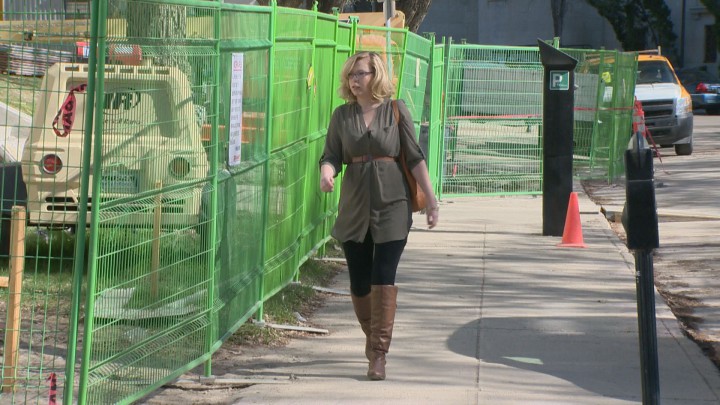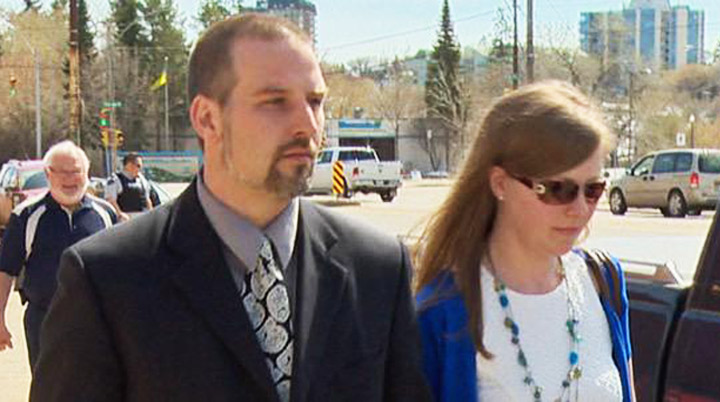Watch above: Recent court cases involving former teachers and a police officer in Saskatoon have raised questions about public perception. Meaghan Craig looks at how organizations deal with negative publicity.

SASKATOON – One constable, two teachers, three different trials. Over the last week, while all three were were inside Saskatoon courtrooms, outside they were also being tried in court of public opinion.
“If you are professional in exchange for your expertise and training and perhaps your special authority, you get some prerogatives and powers that ordinary people don’t,” said William Buschert, philosophy professor at the University of Saskatchewan and applied ethics expert.
“In exchange for those prerogatives you’re held to an higher standard of accountability in a more specific set of rules than ordinary people are.”
On Monday, sentencing was postponed to May 15 for Jayson Kennard, a former teacher found guilty of luring a former student for sex.
READ MORE: Former Saskatchewan teacher awaits fate for child luring
The crown is seeking an 18-month sentence for Kennard, the defence arguing for a 12-month jail term after the former teacher sent sexually explicit text messages to a student when the teen was in Grade 9.
A verdict was set for May 25 in the Erin Osmond’s trial after final arguments were heard in the case on Thursday, April 30.
Osmond a former teacher at Winston High School in Watrous, is accused of sexual exploitation after forming a sexual relationship with a 16-year old former student.
READ MORE: Final submissions made in teacher Erin Osmond’s sexual exploitation case
After a two-day trial last week, Const. Steven Nelson will learn his fate in June after being charged with attempting to obstruct justice and finding himself on an unfamiliar side of the law.
He’s accused of obstructing justice after a second victim statement in a domestic dispute case vanished without a trace between August 2012 and October 2013.
READ MORE: Saskatoon police officer testifies at his obstructing justice trial
Saskatoon residents say the optics of all three cases look bad because those involved are in positions of trust and authority.
“If they’re found guilty that’s serious, serious business but I certainly prefer not to have judgements made until the full legal process has been gone through.”
Still experts say the damage may already have been done.
“The mere perception that a police officer is prepared to substitute his own judgement for proper procedures, it’s potentially devastating to public trust in the administration of criminal justice,” said Buschert.
“It doesn’t play every well with the public and it shouldn’t play very well with the public.”
Saskatoon’s police chief agrees, declining to speak specifically about the Nelson trial.
“It absolutely can and that’s why we have safeguards in place and that’s why we have civilian oversight of policing so if there’s a case of misconduct civilians oversee the investigation not just the police,” said Chief Clive Weighill.
As the trial unfolded, Weighill confirmed that he was briefed on testimony heard in court and said officers being charged with criminal offenses within the force are few and fair between.
“I am very proud of our model of policing and I think we’re very open,” said Weighill.
“If one of our officers is charged with a criminal offense, we put out a press release to advise the public of that. We certainly don’t hide it and it’s an open book, if we have an investigation we let the public know about it.”
Weighill also noted that if there is a case of police misconduct, the Saskatchewan Public Complaints Commission, a five-person, non-police body appointed by the government, steps in.
The commission is responsible for ensuring that both the public and police receive a fair and thorough investigation of a complaint against the police or an officer.
The Saskatchewan Teachers’ Federation also issued a statement:
“As leaders in education, teachers have a responsibility to model positive values, practices and relationships for the children and youth we serve. Teachers understand both the individual and collective impact that our decisions and actions can have on students and the integrity of the teaching profession.”
An official spokesperson for the organization added that if a teacher does not live up to its standards of professional ethics, it reflects poorly on the profession and the actions of the vast majority of teachers who work daily to ensure the safety of children and youth.
According to Buschert, if both organizations use these cases as an opportunity to clarify rules and make the system better, some good can come out of all this.








Comments